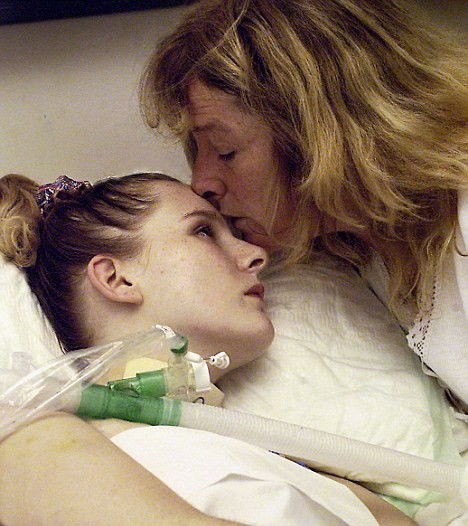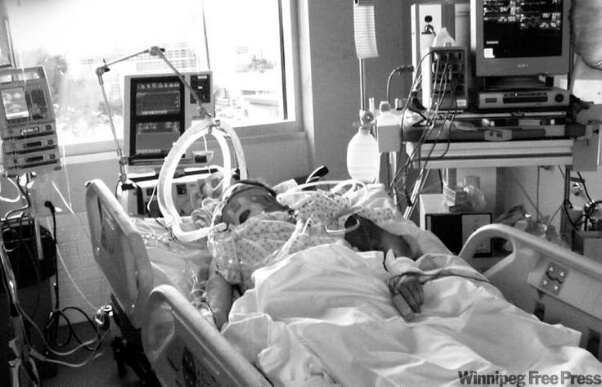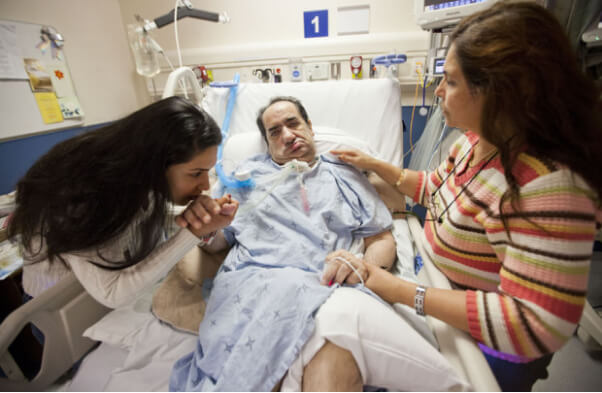Podcast: Play in new window | Download
Subscribe: Apple Podcasts | RSS
Hi, it’s Patrik Hutzel from INTENSIVECAREHOTLINE.COM where we instantly improve the lives for Families of critically ill Patients in Intensive Care, so that you can make informed decisions, have PEACE OF MIND, real power, real control and so that you can influence decision making fast, even if you’re not a doctor or a nurse in Intensive Care!This is another episode of “YOUR QUESTIONS ANSWERED“ and in last week’s episode I answered another question from one of my clients and the question last week was
You can check out last week’s episode by clicking on the link here.
In this week’s episode of “YOUR QUESTIONS ANSWERED“, I want to answer the next question from one of my clients Emma, which are excerpts from 1:1 phone and email counselling and consulting sessions with me and the question this week is
My sister is in ICU on a balloon pump and ventilated after cardiac surgery! The ICU doctors want to stop treatment against our wishes and let her die, what should we do? (PART 9)
You can also access PART1, PART2, PART 3, PART 4, PART 5, PART 6, PART 7 and PART 8 by clicking on the links
In this series of 1:1 phone and email consulting and advocacy sessions with my client Emma you’ll get real in-depth knowledge about cardiac failure in Intensive Care, how it works, the treatment and therapy options, how to wean somebody off the ventilator and most importantly, you’ll discover how to not take “no” for an answer.
You’ll witness how I can lead Emma in going from the Intensive Care team trying to coerce her and her family to agree to a “withdrawal of treatment” as being “in the best interest” for her sister to challenge that and the Intensive Care team having to do everything within their power to safe her sister’s life and turning the dynamics upside down in Emma’s favour.
That’s what happens when you have the right advice from a professional who knows Intensive Care inside out and who knows how to manage the dynamics and who can take the fear away of being intimidated by the Intensive Care team!
Enjoy this consulting and advocacy session!
Related articles/videos:
Hello Patrik,
I had to return to work on today just received a call from my sister’s husband he was in her room when the breathing machine starting making a loud sound he stated that the nurse came in and said that the breathing tube was “ill positioned” so they just went ahead and took it out instead of exchanging it, my brother in law said that my sister had been attempting to pull the tube out.
I just spoke with my sister’s not so nice nurse and was told that her ABG is
- PH 7.5
- PCO2=42 Carbon-dioxide levels
- PO2=191 Oxygen levels
-not sure what that means and my sister is on 6 litre nasal cannula her O2 saturation is 100%, Hgb 8.1, WBC 13 and she has been taken off the vassopressin and epinephrine.
She is now on Norepinephrine 6, Dobutamine 5 and Heparin.
Her blood pressure is 105/45 MAP 66 and that they are continuing to monitor her, please what does all of this mean. The nurse got really agitated when I was asking her the questions. Please I am at work can we correspond by email until I leave work. Thank you
Emma
Hi Emma,
That’s great news!
Your sister is off the ventilator! That’s a huge step she has taken!
If the tube became dislodged it was probably time to come out!
Don’t worry about the nurse not being nice, because you are asking the right questions they feel defensive and also threatened, take it as a compliment!
As I mentioned before, 99% of families in Intensive Care don’t question and Doctors/Nurses in Intensive Care can pretty much do whatever they like… Sad but true…
The numbers in the ABG look good
Ph 7.42 (normal range 7.35-7.45)
PCO2 =Carbondioxide 42 (Normal range 35-45)
PO2= oxygen 191 (normal range> 75)
Those numbers are very good and all the other numbers in the ABG you can pretty much ignore for now, PH, PCO2 and PO2 are the most important results to look for and they look good on 6 litres of oxygen.
I pretty much mentioned before there is a good chance she will come off the vasopressin and Epinephrine when being extubated, I’m glad that’s happened now!
That means her heart is coping so far even though she is still on the Norepinephrine and Dobutamine, but being off the ventilator now is great and a huge achievement after all this back and forth.
Most importantly, we went from the Intensive Care team wanting to inappropriately ceasing life support and inappropriately and prematurely “withdrawing life support” and in essence killing your sister, to your sister now coming off life support and breathing by herself!
What an achievement!
This also shows that you always, always need to challenge the assumptions and actions of the Intensive Care team!
Recommended:
If we hadn’t challenged the assumptions and if we didn’t ask all of the right questions, your sister might be dead by now!
Of course, there is no guarantee that your sister will survive, but she has taken a huge step forward!
The next challenge to get the heart stronger and get her off the Dobutamine and the Norepinephrine. Once that’s achieved, it’s a sign the heart can cope and she will most likely stay off the ventilator and breathing tube!
If she can’t come off the vasopressors/inotropes like Dobutamine and Norepinephrine there is a very good chance your sister may go back on the ventilator and potentially die.
The next few days will show us what will be happening!
Haemoglobin is still a bit low at 8.1 (normal range 12-15.5 in women) and they may have to give her another unit of blood/red packed cells. WCC(=white cell count) 13 is slightly elevated(normal range 4-11) and she may still have an infection somewhere. Getting the WCC down might also help in reducing the Norepinephrine, but let’s take one step at the time.
Blood pressure 105/45 with a MAP 66 is OK, especially the 45 suggests that she’s still a bit dry with all the fluid removal from the CRRT. It’ll be important to keep her still dry over the next few days to make sure the lungs don’t fill up with water, that would be bad.
Please keep asking all the questions to the nurses and doctors no matter their response. They know by now that you have done a crash course in Intensive Care and they know by now you can’t be fooled!
The most important part for now is to keep your sister off the ventilator and the way forward is most likely a combination of giving her oxygen, keep the CRRT/Dialysis going and remove fluids to offload the heart so it doesn’t have to pump too many fluids around and most importantly it doesn’t push fluids back into the lungs.
A weak heart can’t cope with fluid overload, therefore fluids might be pushed back into the lungs causing respiratory failure, with your sister needing mechanical ventilation again!
Therefore with a weak heart and kidney failure, keeping the CRRT/Dialysis going is important to offload the heart, keeping excess fluids out of the lungs.

They need to look at why WCC is still slightly elevated and you may ask them why they think WCC is elevated.
As long as they keep your sister dry with removing fluids she may not be able to get off the Norepinephrine, but for now the goal is to keep her off the ventilator and given that she’s off the vasopressin and the Epinephrine she’s taken big steps already!
Overall, I’m very pleased about your sister’s progress!
Again, give yourself a pad on your back for seeking help, for asking the right questions and for not taking “no” for an answer.
Here are the next steps
- Physical therapy/Physiotherapy with a focus on breathing exercises, strengthening her breathing muscles, starting to get strength back in her arms and legs, as well as sitting out of bed and/or sitting on the edge of the bed to begin with
- Echocardiogram/Ultrasound of the heart with a new assessment of the contractility(=pump function) of the heart. This will give the doctors renewed readings of the Ejection fraction(EF). I’m positive that EF has improved and remains 50% or more, which is one of the reasons why she’s off the Vasopressin and the Epinephrine(=inotropes/vasopressors). With an improved EF they can hopefully start weaning the Dobutamine and the Norepinephrine(=inotropes/vasopressors). This could well take a few more days, however as you know by now, nothing happens fast in Intensive Care, therefore be patient and don’t be discouraged if it doesn’t happen straight away
- They will need to keep monitoring her arterial blood gases over the next few days, especially PCO2/Carbondioxide(normal range 35-45 mmHG) and PO2/Oxygen levels in the blood(normal levels>75 mmHG). This are the most important parameters to look for, as well ensuring your sister can produce a good strong cough.
- Keep in mind one of the most important factors to keep your sister off the ventilator is to sit up in bed if she can’t get out of bed yet. One of the most common complications in Intensive Care for bed ridden Patients is a Pneumonia because of the immobility, therefore the lungs can’t expand fully which is causing the Pneumonia. Therefore ongoing breathing exercises, deep breaths and coughing will be very very important
- Furthermore, from what I can see, they will need to continue to be aggressively removing fluids via CRRT/Dialysis to keep fluids of the heart and the lungs. Too many fluids could decompensate the heart and set your sister back. The blood pressure around 100/40 with a MAP of ~65 suggests she’s dry and that they are aggressively removing fluids. This could also put a delay in weaning off the Norepinephrine in particular as the Norepinephrine is used for managing a low blood pressure. The more fluids are being removed the more likely it is that your sister has a low blood pressure, hence more need for Norepinephrine
- Once your sister’s heart is off the Dobutamine they may be able to slow down fluid removal slightly via the CRRT/Dialysis
- Also, speak to one of the doctors and find out what they want to meet about. Don’t let them get away with a vague answer, let them be clear. As I said I would be very happy to dial into the meeting over the phone
- Also, with aggressive fluid removal from the CRRT they will need to keep an eye on your sister’s Potassium and Magnesium. I’m certain they are replacing Potassium already and they can monitor the Potassium levels in the arterial blood gas. Potassium levels should be between 4.5-5.0. This level is quite important because a higher or a lower level could cause an irregular heart rhythm such as A-fib also known as A-flutter or AF. I understand she hasn’t had any AF, but I think the more you understand the better and you can start questioning more.
Hopefully your sister will continue to improve going forward!
I hope that helps for now, it’s great news! Give yourself a pad on your back for being so strong and giving your sister a second chance at life!
I will give you a call a bit later in the evening your time, if you need anything in the meantime, please let me know and I can give you a call earlier!
Kind Regards
Patrik
Recommended:
Hi Patrik,
Thank you for all of this, me and my family appreciate you doing this and having you as a consultant and advocate on board!
I was able to speak with the intensive care doctor tonight. I expressed my concern with the need for her to have physical therapy and breathing exercises and an ECHO/Ultrasound. The doctor said that he would put in orders for each of these as requested.
The doctor informed me and my sister’s husband that due to my sister’s change in status the “doctor” whom originally said that my sister surgery would not be performed in that hospital will be meeting in some committee and with cardiology to determine whether or not they are willing to do my sister’s surgery since she has a change in status. This doctor told me that they would know something by tomorrow at nine o’clock am and that they will speak with the family at that time. I explained to this doctor that we would like an agenda prior to this family meeting. Also I questioned the doctor concerning my sister elevated WCC source and he stated “septic” originally the doctors told me she had bacteraemia. Please advise.
Emma
Hi Emma,
I’m glad you continue to make requests to them, well done!
Let’s wait and see if he follows through with the orders and let’s judge him on his actions and not his words.
I’m glad that the surgeon is now “consulting” with Cardiology to explore the option for surgery for your sister. I would imagine that after this consultation has taken place they might ask for a meeting with you.
There clearly and evidently has been a change in status of your sister’s condition. Going from the Intra-aortic Balloon pump(IABP) with the outlook of “no chance of survival” without the balloon pump and the Intensive Care team wanting to “withdraw treatment” without your consent, to now having her off the ventilator breathing by herself and having the inotropes/vasopressors reduced significantly warrants a reassessment of your sister’s situation!
Find out about the meeting agenda first. Having said all of that, I do believe that doing the surgery might well be an option now and it also comes down to if they think your sister is well enough to go into lengthy and also risky open heart surgery procedure. I’m sure they weigh up the pros and cons.
As it relates to WCC, there must be an infection/ Sepsis somewhere and it is their job to find out where the infection is located. Ways to find out are
- Chest x-ray plus sputum sample from the lungs to determine if she has a chest infection/ Pneumonia
- Urine sample(if she makes any urine at all) to check for urinary tract infection
- Blood cultures and checking for blood stream infection in
- Swaps from any lines including CVC , arterial line and the Dialysis catheter
- Potentially changing CVC and arterial line if >7 days due to the increased infection risk
- Once they found the source of infection and the bacteria/virus/fungus then treat appropriately
- If they can’t find any source of infection, they need to change all the lines CVC, arterial line and Dialysis catheter
If you are talking to the doctors tomorrow and you need my help, please give me a call.
Any questions in the meantime, please let me know.
Kind Regards
Patrik
How can you become the best advocate for your critically ill loved one, make informed decisions, get peace of mind, control, power and influence quickly, whilst your loved one is critically ill in Intensive Care?
You get to that all important feeling of making informed decisions, get PEACE OF MIND, CONTROL, POWER AND INFLUENCE when you download your FREE “INSTANT IMPACT” report NOW by entering your email below!
In Your FREE “INSTANT IMPACT” report you’ll learn quickly how to make informed decisions, get PEACE OF MIND, real power and real control and how you can influence decision making fast, whilst your loved one is critically ill in Intensive Care! Your FREE “INSTANT IMPACT” Report gives you in-depth insight that you must know whilst your loved one is critically ill or is even dying in Intensive Care!
Sign up and download your FREE “INSTANT IMPACT” REPORT now by entering your email below! In your FREE “INSTANT IMPACT” REPORT you’ll learn how to speak the “secret” Intensive Care language so that the doctors and the nurses know straight away that you are an insider and that you know and understand what’s really happening in Intensive Care! In your FREE report you’ll also discover
- How to ask the doctors and the nurses the right questions
- Discover the many competing interests in Intensive Care and how your critically ill loved one’s treatment may depend on those competing interests
- How to eliminate fear, frustration, stress, struggle and vulnerability even if your loved one is dying
- 5 mind blowing tips& strategies helping you to get on the right path to making informed decisions, get PEACE OF MIND, control, power and influence in your situation
- You’ll get real world examples that you can easily adapt to your and your critically ill loved one’s situation
- How to stop being intimidated by the Intensive Care team and how you will be seen as equals
- You’ll get crucial ‘behind the scenes’ insight so that you know and understand what is really happening in Intensive Care
- How you need to manage doctors and nurses in Intensive Care (it’s not what you think)
Thank you for tuning into this week’s YOUR QUESTIONS ANSWERED episode and I’ll see you again in another update next week!
Make sure you also check out our “blog” section for more tips and strategies or send me an email to [email protected] with your questions!
Or you can call us! Find phone numbers on our contact tab.
Also check out our Ebook section where you get more Ebooks, Videos and Audio recordings and where you can also get 1:1 counselling/consulting with me via Skype, over the phone or via email by clicking on the products tab!
This is Patrik Hutzel from INTENSIVECAREHOTLINE.COM and I’ll see you again next week with another update!





